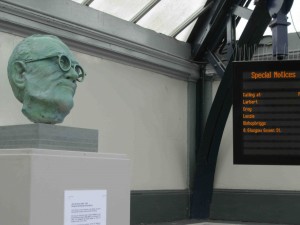The John Grierson Archive has been held at the University Archives since the early 1970s and continues to be one of our most popular collections. This reflects Grierson’s importance in cinema history, often being described as ‘the father of documentary film.’

There seems to be a renewed interest in Grierson in the ether at the moment. His bust now stands proudly in Stirling Train Station, placed there as part of the great efforts of the Stirling Rotary Club to improve the building. The choice of the station is apt as one of Grierson’s best known films is Nightmail, the 1936 documentary tracing the journey of the post train from London to Scotland made by the GPO Film Unit. The film has also recently been the inspiration for a new track by Public Service Broadcasting, a musical project inspired by old public information films:
Nightmail – Public Service Broadcasting
Another musical response to Grierson’s work was recently created by the band Field Music who composed a new live score to accompany Drifters, Grierson’s 1929 documentary about North Sea fishermen. The band premiered this new soundtrack at the Berwick Film Festival and plan further performances in the coming months.

Drifters was originally a silent film, but Grierson was aware of the potential of music to heighten the dramatic intensity of the heroic struggles of the fishermen he recorded. He laid out very clear instructions for his suggested musical accompaniment to the film, choosing pieces of stirring classical music such as Mendelssohn’s Fingal’s Cave to accompany the action.